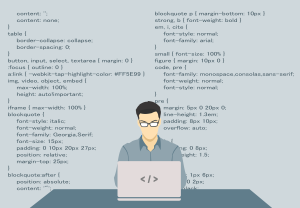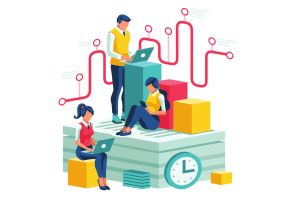Introduction
In today’s rapidly evolving digital landscape, a tech career isn’t limited to those with traditional technical backgrounds. Non-techies, with their unique perspectives and skills, can find a fulfilling and prosperous path within the tech industry. In this article and other articles that I will write under the Transition to Tech category, I will guide non-techies on transitioning to the tech world, providing insights into both coding and non-coding job areas.
First things first
Almost everything in Tech revolves around Software Development. The software is developed to solve a problem or make life better. For example, you have Facebook helping connect people or Amazon helping people to buy stuff online where you can see reviews from others who have bought the product or you have LinkedIn that helps connect professionals and gives you an online profile to show your experience and skills. Other things in tech like Cloud Platforms Azure, AWS and GCP help power this software. You also have hardware like Laptops, Mobile Phones, Smartwatches, and IOT devices which are all powered by software. So, if you find yourself in the tech industry you are most likely building software or supporting the people building software.
Is Every Tech Person a Coder?
Now a lot of people are worried about moving into Tech because they think everyone in Tech writes software and they think it is very difficult or not something they want to do. This is especially true for people who do not have any science or engineering backgrounds. However, in Tech there are coding and non-coding areas which we will explore below with descriptions for each of those areas. Even within the coding areas you also have software development areas and non-core software development areas. Let us dive into the different career paths in Tech.
Transitioning to Tech: Coding Career Paths

Software Development Areas
- Front-End Development: Front-end developers focus on creating the user interface and user experience of websites and web applications. They work with technologies like HTML, CSS, and JavaScript to design and implement the visual elements that users interact with. Some of the common front-end Technologies are React.js, Vue.js, and Angular.js
- Back-End Development: Back-end developers are responsible for the server side of web applications. They work on server logic and databases, develop APIs and the application’s core functionality, and ensure data is processed and stored securely. Some of the common back-end programming languages are C#, Java, Node.js, Python, and Golang.
- Fullstack Development: There are also Full-stack developers. These developers are proficient in both front-end and back-end development. They can work on all aspects of web application development, from user interfaces to server-side logic.
- Mobile App Development: Mobile app developers create applications for smartphones and tablets. They may specialize in either iOS (Apple) or Android (Google) app development, or work with cross-platform frameworks.
- Software Testing: Software testers evaluate and ensure the quality and reliability of software applications. They conduct various tests to identify bugs and issues, helping developers improve the software. They use tools like Selenium, Appium, BrowserStack, Postman, and JMeter.
- DevOps: DevOps engineers bridge the gap between software development and IT operations. They focus on automating processes, deploying software efficiently, and ensuring the reliability of systems. They use tools like Azure DevOps, GitHub Actions, Octopus Deploy, TeamCity, Jenkins, Chef, Puppet, and Ansible.
Non-Software Development Areas
- Data Analysis: Data analysts examine and interpret data to help organizations make informed decisions. They use statistical techniques and data visualization to discover insights and trends. They use tools like Power BI, Tableau, and Excel.
- Data Science: Data scientists collect and analyze large datasets to extract valuable insights and predict future trends. They often use machine learning and AI algorithms to solve complex problems.
- IT Infrastructure: IT infrastructure professionals manage an organization’s technology resources, including servers, networks, and hardware. They ensure that the IT environment is secure and runs smoothly.
- Machine Learning: Machine learning engineers build systems that can learn and make predictions based on data. They work with algorithms and models to create intelligent applications.
- Artificial Intelligence: AI engineers develop systems that can perform tasks that typically require human intelligence, such as natural language processing and image recognition.
- Robotic Process Automation: RPA professionals use software robots to automate repetitive tasks and workflows in business processes. This technology streamlines operations and reduces human effort.
- Cybersecurity: Cybersecurity experts protect computer systems, networks, and data from cyber threats and attacks. They work to identify vulnerabilities and implement security measures to safeguard digital assets.
- Networking: Network professionals design, implement, and maintain computer networks. They ensure data is transmitted securely and efficiently, and troubleshoot network issues.
Transitioning to Tech: Non-Coding Career Paths

- Product Management: Understand the role of product managers who bridge the gap between tech and business, helping shape successful tech products. They use tools like Jira.
- User Experience (UX) Design: Explore the realm of UX design, where you can enhance user interfaces and create exceptional digital experiences without coding. They use tools like Figma, Adobe XD, Zeplin, and Proto.io.
- Digital Marketing: Learn how digital marketing can be a non-technical yet vital part of the tech industry, involving SEO, content creation, and analytics.
- Project Management: Discover how project managers ensure the successful execution of tech projects, from planning to delivery.
- Business Analysis: Business Analysis is the process of identifying business needs, problems, and opportunities and finding solutions to address them. Business Analysts play a key role in bridging the gap between business stakeholders and IT teams. They gather and document requirements, analyze data, and propose strategies to improve business processes and achieve organizational goals. Business Analysis helps organizations make informed decisions and ensure that projects deliver value.
- Scrum Master: A Scrum Master is a facilitator and servant-leader in Agile development. They ensure that Agile teams follow the Scrum framework and Agile principles, assisting them in working effectively and delivering value. Scrum Masters help remove obstacles, improve collaboration, and enable self-organization within the team. They also conduct Scrum ceremonies, such as Daily Standups and Sprint Reviews, to ensure projects progress smoothly. Scrum Masters play a crucial role in fostering a culture of continuous improvement and helping teams reach their full potential.
Choosing Your Path
Transitioning to tech is an inclusive journey, where the tech industry welcomes non-techies with open arms. It offers a plethora of coding and non-coding career options. Although coding career paths favor individuals with a Computer Science background, anyone ready to learn it can always switch to a coding career. When entering this exciting field of Tech, you have to consider your interests, strengths, and the skills you’d like to develop. With the right guidance, a mentor, and a clear path in mind, you can embark on a rewarding tech career journey, regardless of your technical background. Moreover, you can always find Beginner Tutorials on YouTube, such as Front-End Development for Beginners, to kickstart your learning journey. You can also reach out to me in the comment section and in the contact page if you are transitioning to tech or planning to do so. I’ll be happy to help.
Part 2 of this topic is out here and it gives insight into how your skills can relate to different fields in Tech. Happy Reading.







16 comments
My background is in finance and accounting, what pathways might be suitable based on your wealth of experience in tech.
Based on your background, I will suggest Business Analysis or Data Analysis. But it boils down to your passion and interest and how much you are willing to put into learning it. You can go to YouTube and search for “Business Analysis for Beginners.”
This is very insightful.
Thank you 🙏
Am glad you found this very insightful. Are there any other areas you would like me to talk about in the future?
Thank you for breaking this down into details!
I have been trying to find my path in tech and I am finding myself in all. Maybe because job responsibilities takes me into various aspect of tech. From Software Testing Analyst to Business Analyst to Process Analyst. I have basic knowledge in html, CSS, Python, cyber security, project management and few statistical packages; in addition to my first degree in Computer Science and second degree in Information Science. Although I found they all are somewhat interrelated, I really want to focus on one. From your wealth of experience, which would you suggest a busy mom should stick to.
Okay so first things first. You are already clearly in Tech. But I can see that you want to choose or define a path for yourself. Ultimately, the choice depends on you. But based on your experience, I’ll advise you to look into roles like Project Manager, Quality Assurance Manager, Product Owner, Technical Writing (Technical writing allows you to leverage your knowledge to create documentation, user guides, or educational content and is one you can work at your own pace and time though you may not find too many roles available for it but you can do your research), Database Administrator and Cybersecurity Analyst.
Thank you for breaking it in simple terms,I’m in Arts but have always had my eyes for tech but don’t know how to go about it,I have interest for cyber security but at the same time product and project management is something I know I can do. What do you advise
The final decision is up to you but I’ll advise you go with Product Management.
Thank you for this freebies. This is a big push for me. currently in media space but I’m desperate to switch into tech. I will need your huge guide on which aspect to key into.
Super Dad LMBS(member)
This is great and welcome in advance. Tech is actually designed for anybody without a Tech degree to enter. This is a first part and the second part I will be releasing by Wednesday will enlighten you more and guide you better to know what part in Tech to transition to as we will be looking at it in Categories and explaining how each person can align to a particular category. Whether you are a creative, administrative person, support person or someone that like to manage projects, analyze or create things.
Part 2 of this topic is out here and it will answer several questions already asked here. https://ifeanyiokagbue.com/tech/transition-to-tech-for-non-techies-skills-mapping-to-tech-fields/
This is a good read. Thank you Ifeanyi for breaking the different niches in tech so well.
I have not seen it this detailed.
Let me hurry to part 2 and I hope I can reach out to you anytime for assistance.
Hello Ebele, thank you for reading and I am glad I was able to break it down for you to understand. I will be happy to hear your comments again after reading the Part 2. For assistance, yes you can reach out to me via ifeanyi.okagbue@gmail.com or ifeanyi@ifeanyiokagbue.com. I will be happy to help. I will also be happy to hear if there are other topics you will like me to write about and if you can help me share the link amongst your networks.
nice one bro. what an interesting read.
Thank you. I appreciate your comments and feedback.
You may also like this. https://ifeanyiokagbue.com/tech/building-your-future-in-tech/